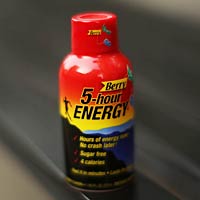
Getty Images
It used to be the only thing caffeinated in our diet
was coffee and tea and perhaps the occasional soda. But over the past few years
it’s an additive that’s crept into everything from sports drinks to jelly beans. This week, Cracker Jacks announced plans for a new line of caffeine-infused Cracker Jack'D Power Bites. The Centre for Science in the Public Interest is none too pleased we’re turning into
Caffeine Nation. They view it as a potentially dangerous trend. They might be
right.
The U.S. Federal Drug Administration recently released records naming Monster Energy and Rock Star Energy Drink as a factor in injury reports,
while the drink 5-Hour Energy has been mentioned in at least 90 injury reports including 33
hospitalizations and 13 deaths in the past 4 years. Although such reports don’t
prove the drink was responsible for the injuries or deaths, many energy drinks
contain massive amounts of caffeine per serving. A 2011 Pediatrics study found that the total amount of caffeine contained in some
cans or bottles of energy drinks exceeded 500 mg or the equivalent of 14 cans
of caffeinated soft drinks. This, they concluded, was a high enough amount to
induce caffeine toxicity especially if several servings are consumed in a brief
period of time.
Drink makers say their products are safe and unrelated
to the problems reported to the F.D.A., says Michael Jacobson, PhD, the
Center’s executive director, who concedes that it’s unclear why the energy
drinks have been associated with so many deaths–while coffee, which also is
consumed in large quantities, has not been. “It’s possible that there is some
interaction between caffeine and other ingredients,” he said. Or, it’s possible
that the deaths were not caused by the energy drinks.
Regardless, CSPI, other consumer advocacy groups, and
some law makers want the F.D.A. to take a closer look into their current
guidelines regarding caffeine levels in beverages. The limit is supposed to be
about 70 milligrams per 12-ounce soda, but energy drinks–although they’re
typically sold alongside soft drinks and packaged in a similar way–fall under
the category of food supplements, which aren’t subject to the same rules.
(Products like Red Bull are marketed as energy drinks, while 5-Hour Energy,
Rock Star Energy, and Monster Energy are marketed as dietary supplements.)
But CSPI’s biggest concern is that the door is now
open for adding a java jolt to all sorts of products, especially ones that are
attractive to teens and younger kids. “The FDA’s non-enforcement of its
regulation has given a green light to industry to add caffeine to a wide range
of products, including potato chips, gummi bears, mints, granola, and trail
mix,” Jacobson says. “With more and more foods containing caffeine, the risk of
overdoses increases.”
Source: News Health
Please share
You can definitely see your enthusiasm within the work you write.
ReplyDeleteThe arena hopes for even more passionate writers such as you who aren't afraid to say how they believe. All the time go after your heart.
My web blog ... bestproteinpowder.lo.gs
It's really a cool and helpful piece of info. I am happy that you just shared this useful information with us. Please keep us up to date like this. Thanks for sharing.
ReplyDeleteHere is my site http://guemau.com/blog/view/1285/in-depth-information-about-schussler-salts
Hi there! This blog post could not be written much better!
ReplyDeleteReading through this article reminds me of my previous roommate!
He always kept talking about this. I most certainly will send this article to him.
Fairly certain he'll have a good read. Many thanks for sharing!
My homepage ; playstation 3 ebay
What's up Dear, are you actually visiting this website on a regular basis, if so after that you will absolutely get fastidious know-how.
ReplyDeleteHere is my blog post - 96.30.5.150
Thanks for sharing your thoughts. I really appreciate your
ReplyDeleteefforts and I am waiting for your further write ups thanks
once again.
Here is my page :: preworkout promotion